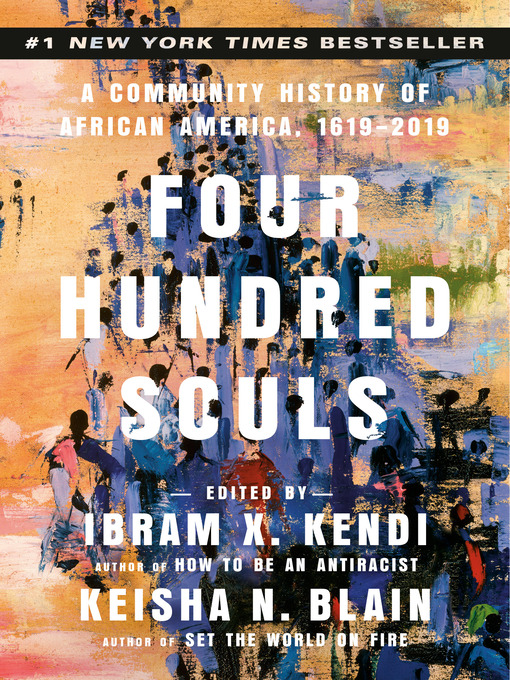
Four Hundred Souls
A Community History of African America, 1619-2019
FINALIST FOR THE ANDREW CARNEGIE MEDAL • NAMED ONE OF THE BEST BOOKS OF THE YEAR BY The Washington Post, Town & Country, Ms. magazine, BookPage, She Reads, BookRiot, Booklist • “A vital addition to [the] curriculum on race in America . . . a gateway to the solo works of all the voices in Kendi and Blain’s impressive choir.”—The Washington Post
“From journalist Hannah P. Jones on Jamestown’s first slaves to historian Annette Gordon-Reed’s portrait of Sally Hemings to the seductive cadences of poets Jericho Brown and Patricia Smith, Four Hundred Souls weaves a tapestry of unspeakable suffering and unexpected transcendence.”—O: The Oprah Magazine
The story begins in 1619—a year before the Mayflower—when the White Lion disgorges “some 20-and-odd Negroes” onto the shores of Virginia, inaugurating the African presence in what would become the United States. It takes us to the present, when African Americans, descendants of those on the White Lion and a thousand other routes to this country, continue a journey defined by inhuman oppression, visionary struggles, stunning achievements, and millions of ordinary lives passing through extraordinary history.
Four Hundred Souls is a unique one-volume “community” history of African Americans. The editors, Ibram X. Kendi and Keisha N. Blain, have assembled ninety brilliant writers, each of whom takes on a five-year period of that four-hundred-year span. The writers explore their periods through a variety of techniques: historical essays, short stories, personal vignettes, and fiery polemics. They approach history from various perspectives: through the eyes of towering historical icons or the untold stories of ordinary people; through places, laws, and objects. While themes of resistance and struggle, of hope and reinvention, course through the book, this collection of diverse pieces from ninety different minds, reflecting ninety different perspectives, fundamentally deconstructs the idea that Africans in America are a monolith—instead it unlocks the startling range of experiences and ideas that have always existed within the community of Blackness.
This is a history that illuminates our past and gives us new ways of thinking about our future, written by the most vital and essential voices of our present.
-
Creators
-
Publisher
-
Awards
-
Release date
February 2, 2021 -
Formats
-
Kindle Book
- ISBN: 9780593134054
-
OverDrive Read
- ISBN: 9780593134054
-
EPUB ebook
- ISBN: 9780593134054
- File size: 7942 KB
-
-
Accessibility
Publisher statement (EPUB)
The publisher provides the following statement about the accessibility of the EPUB file supplied to OverDrive. Experiences may vary across reading systems. After borrowing the book, you may download the EPUB files to read in another reading system.
Summary
Accessibility features highlighted in metadata are based on this ebook's content and format.
Ways Of Reading
Appearance of the text and page layout can be modified according to the capabilities of the reading system (font family and font size, spaces between paragraphs, sentences, words, and letters, as well as color of background and text).
Not all of the content will be readable as read aloud speech or dynamic braille.
Conformance
No information is available.
Navigation
Table of contents to all chapters of the text via links.
Additional Information
High contrast between text and background
Color is not the sole means of conveying information
-
Languages
- English
-
Reviews

Loading
Formats
- Kindle Book
- OverDrive Read
- EPUB ebook
Languages
- English
Loading
Why is availability limited?
×Availability can change throughout the month based on the library's budget. You can still place a hold on the title, and your hold will be automatically filled as soon as the title is available again.
The Kindle Book format for this title is not supported on:
×Read-along ebook
×The OverDrive Read format of this ebook has professional narration that plays while you read in your browser. Learn more here.